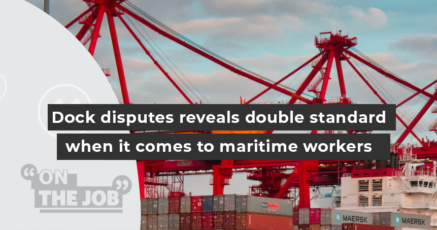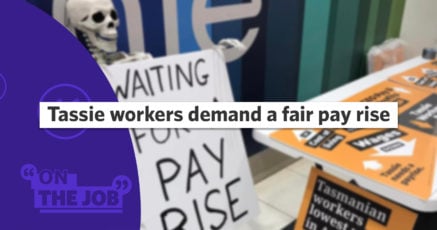When the price tags on the new shirt you’re about to buy seem too good to be true, that’s because they probably are. What you hold in your hands could well be the product of modern slavery.
This situation occurs more likely than we might think, judging from the findings from International Justice Mission’s (IJM) latest report: “Spot Fires in the Supply Chains”. The report claims more than 90% of Australian businesses have identified potential modern slavery risks in their supply chains.
Textiles, clothing, and footwear (TCF) are sectors that have significant risk exposures to modern slavery practices in their supply chains.
Child labour, bonded labour and other human rights abuses don’t just happen overseas. These forms of exploitation to make clothes and cheap products happen in Australia too.
The Australian race to the bottom
Here in Australia, workers who should be employed in decent, secure permanent jobs in the TCF sector, are also being exploited by unscrupulous employers in the race to the bottom to produce cheap product for consumers.
The findings in the IJM report don’t inspire much faith in some local business practices:
- Many corporations exposed to significant supply chain risk are doing the bare minimum required under the Modern Slavery Act.
- Nearly 75 per cent of statements from company respondents only met basic reporting obligations and some did not even satisfy these minimum obligations.
- 85 per cent of company statements did not indicate a single instance where a company responded to actual or alleged modern slavery in their operations or supply chains.
IJM Chief Advocacy Officer Amy Smith is concerned businesses operating in Australia are not doing nearly enough to stamp out worker exploitation in their supply chains.
The really disappointing thing is there is such a high level of non-compliance in Australia. And it seems to be a huge gap between corporate Australia’s understanding of both the problem of modern slavery and how we’re actually going to fix it.
Amy Smith
International Justice Mission Chief Advocacy Officer

Smith is counting on a revamp of Australia’s Modern Slavery legislation that will give it teeth and ensure that those companies that neglect their responsibilities to police their supply chains are held accountable.
“The encouraging thing is that the Commonwealth Modern Slavery legislation is due to be reviewed, the review should be finished by March next year. What’s missing from this legislation is any kind of decent penalties and corporate Australia needs to take these pretty seriously.”
Manufacturers have had a history of similar exploitative working arrangements to produce cheap garments and goods, particularly when considering the previous use of Indigenous indentured labour in this country.
This foundation in oppressive labour practices has led to the opaque supply chains we see today, entailing important implications for Australian workers.
Unions work for supply chain improvements
Ethical Clothing Australia (ECA) is an accreditation body that works collaboratively with local textile, clothing and footwear businesses. Its focus is protecting the rights of Australian garment workers.
Businesses have to meet a certain standard of operations to attain ECA accreditation.
To do so, they must first allow an audit of their operations both in Australia and overseas. This audit is to ensure local TCF workers, including outworkers (contractors who work at home or at a place other than the business premises) are being paid appropriately, receiving all their legal entitlements and are working in safe conditions.
Beth MacPherson is the National Compliance Officer in the TCF sector of the manufacturing division of the CFMEU. She works closely with ECA to monitor the sector and ensure any business seeking ECA accreditation meets the standard right throughout its supply chain.
MacPherson told On the Job that the work ECA and the CFMEU Manufacturing division are doing has made a huge difference in the Australian TCF sector.
Our Union has lobbied hard for legislative change. On the ground, more and more companies have come on board with ECA accreditation. When a company applies, its whole supply chain gets investigated. The spin-off from that is it starts to fit the profile of the company – they’re now promoting that they are ECA accredited
Beth MacPherson
CFMEU National Compliance Officer, manufacturing division

The growing prominence of ECA accreditation has meant that exploited workers now seek out the CFMEU and the ECA to report exploitative practices. MacPherson says there are still recalcitrant operators out there who won’t budge.
“It’s a mindset. Some companies or labels or brands, think that they can get away with it, and that no one’s going to find out. Unfortunately, that still happens”
Identifying forms of non-compliance at your workplace
The CFMEU National Compliance Officer points out that non-compliance takes on many forms.
“There can be non-compliance in occupational health and safety that we’re looking at in factories, or there could be non-compliance in workers’ entitlements, particularly around non-payment of superannuation which is quite a significant issue for us,” MacPherson says.
“There are occupational health and safety issues around exit doors being locked or not signed properly. There are issues with electrical test and tag of equipment and the availability of fire extinguishers, the list goes on.”
MacPherson is adamant there is no reason why workers in the TCF sector aren’t able to enjoy safe, decent permanent jobs.
“There’s an abundance of work. There’s been a huge drive for local supply over the last 10 years. Over the pandemic there’s even more of a consumer push to buy locally made products. We’ve found that consumers are now asking that question,” she says.
“There’s absolutely no excuse for bad behaviour in this industry, there just isn’t.”
Francis Leach is a proud member of the CFMEU Manufacturing division.













SHARE:
Making sure we’re not dressed in modern slavery